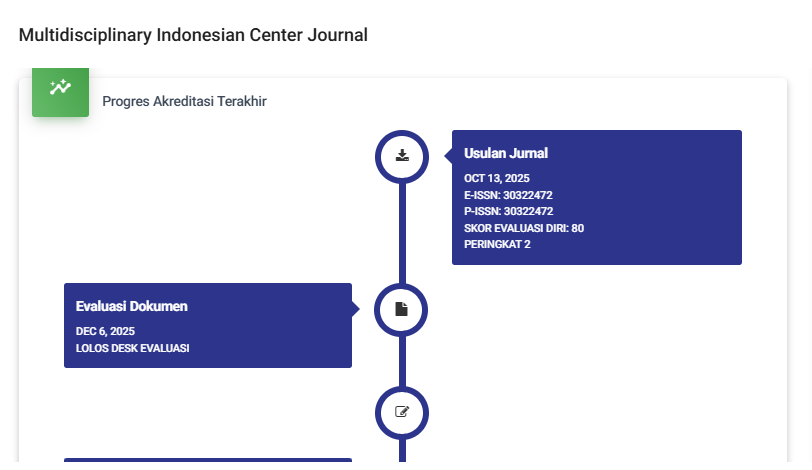LEGAL CERTAINTY OF FINANCING OF MERAH PUTIH VILLAGE COOPERATIVES: INSTITUTIONAL ANALYSIS BETWEEN THE PRINCIPLE OF COOPERATIVE INDEPENDENCE AND STATE INTERVENTION
DOI:
https://doi.org/10.62567/micjo.v2i2.1145Keywords:
Cooperative Autonomy, State Intervention, Legal Certainty, Public Finance, Rural Development.Abstract
This study examines the legal certainty of financing for Indonesia's Desa Merah Putih Cooperative (KDMP) initiative, analyzing the institutional tension between cooperative independence and state intervention. Rooted in the constitutional mandate for cooperatives as a cornerstone of the Indonesian economy, the KDMP program aims to establish 80,000 village-level cooperatives through state-facilitated credit lines and technical assistance. However, this top-down model raises concerns about undermining cooperative autonomy enshrined in Law No. 25/1992 and the principle of subsidiarity. Employing a normative juridical research design, this study draws on secondary data from legal literature and primary legal materials to systematically examine relevant norms and doctrines. Findings reveal a tenuous alignment between state financing mechanisms and cooperative autonomy, primarily due to the proposed reliance on state-owned bank credit lines rather than direct state budget grants, leading to legal ambiguity regarding accountability and oversight. The potential for mass loan defaults and the contentious use of Village Funds as collateral further complicate legal certainty and risk hidden liabilities. Comparative insights from India's Amul cooperative and the Philippines' barangay cooperatives illustrate successful models where government acts as a facilitator without impinging on cooperative self-governance or member control. This study advocates for a recalibrated regulatory approach featuring transparent oversight, proportional supervision, and participatory decision-making to reconcile developmental imperatives with cooperative principles, ultimately enhancing legal certainty and ensuring that state-supported cooperatives remain genuinely member-driven enterprises.
Downloads
References
Azzahra, Q. (2025). Kopdes Merah Putih Berisiko Gagal Bayar Rp7,18 Triliun per Tahun. Tirto. https://tirto.id/kopdes-merah-putih-berisiko-gagal-bayar-rpj18-triliun-per-tahun-heGW
Chen, F., Xu, Z., & Luo, Y. (2023). False prosperity: Rethinking government support for farmers’ cooperatives in China. Annals of Public and Cooperative Economics, 94(3), 905–920. https://doi.org/10.1111/apce.12420
Damodaran, H. (2023). Why the government ought not to intervene with Amul. Indian Expressxpress. https://indianexpress.com/article/opinion/columns/amul-model-has-been-about-farmer-empowerment-professional-management-8383700/
Dervillé, M., Manriquez, D., Dorin, B., Aubron, C., & Raboisson, D. (2023). Indian dairy cooperative development: A combination of scaling up and scaling out producing a center-periphery structure. World Development, 170, 106249. https://doi.org/10.1016/j.worlddev.2023.106249
Edna Co. (2012). Chapter 1: Cooperation between LGUs and CSOs in Local Governance. www.ombudsman.gov.ph/UNDP4/wp-content/uploads/2012/12/Chap1_CoopLGU.pdf.
Ghosh, A. (2013). Embeddedness and the Dynamics of Growth The Case Of Amul Cooperative, India. UNRISD Conference Potential and Limits of Social and Solidarity Economy, 1–21. https://knowledgehub.unsse.org/wp-content/uploads/2023/08/Embeddedness-and-the-Dynamics-of-Growth.pdf
Ghosh, A., & Chakrabarti, A. (2025). The Emergence of a Cooperative Amidst Economic Disruption: A Historical Narrative of Amul Coop in India. Administrative Sciences, 15(6), 214. https://doi.org/10.3390/admsci15060214
Hadi, S., & Michael, T. (2022). Hans Kelsen’s thoughts about the law and its relevance to current legal developments. Technium Social Sciences Journal, 38, 220–227. https://doi.org/10.47577/tssj.v38i1.7852
Harinurdin, E., Laksmono, B. S., Kusumastuti, R., & Safitri, K. A. (2025). Community Empowerment Utilizing Open Innovation as a Sustainable Village-Owned Enterprise Strategy in Indonesia: A Systematic Literature Review. Sustainability, 17(8), 3394. https://doi.org/10.3390/su17083394
Hidayat, R., Irawan, N., & Aryani, L. (2024). A scoping analysis of collaborative governance in preventing and dealing with the crime of human trafficking in Indonesia. Journal of Infrastructure, Policy and Development, 8(8), 1–24. https://doi.org/10.24294/jipd.v8i8.4614
International Co-operative Alliance Asia and Pacific. (2021). Philippines Legal Framework Analysis National Report Philippines. https://coops4dev.coop/sites/default/files/2021-06/Philippines Legal Framework Analysis National Report.pdf
Judijanto, L., Sufriaman, S., Muhammadong, M., & Mu’min, H. (2024). Islamic Law Review of Sharia Cooperative Practices in Indonesia. West Science Islamic Studies, 2(04), 178–183. https://doi.org/10.58812/wsiss.v2i04.1347
Kementerian Keuangan RI. (2019). Kajian Fiskal Regional Provinsi Nusa Tenggara Barat Tahun 2019.
Leawoods, H. (2000). Gustav Radbruch: An Extraordinary Legal Philosopher. Washington University Journal of Law & Policy, 2(1), 489–515. https://openscholarship.wustl.edu/law_journal_law_policy/vol2/iss1/16
Mayasari, D., & Lokantara, I. G. W. (2025). Modern Cooperative Governance in Indonesia: Policy Insights from Koperasi Usaha Mandiri, Belitung. Journal of Tourism Economics and Policy, 5(2), 298–308. https://doi.org/10.38142/jtep.v5i2.1361
Mehta, U., Shah, B., & Vala, K. (2025). Transforming Rural Livelihoods: A Review of Dairy Cooperatives and the Amul Model for Sustainable Development of Dairy Farmers. International Journal of Advanced Research in Commerce, Management & Social Science, 08(01(II)), 129–135. https://doi.org/10.62823/IJARCMSS/8.1(II).7256
Nagel, B., Anggraini, E., Buhari, N., Gray, S., Partelow, S., & Schlüter, A. (2024). Mental models of aquaculture governance in Indonesia. Sustainability Science, 19(6), 1825–1845. https://doi.org/10.1007/s11625-024-01545-y
Portail Informasi Indonesia. (2020). Alokasi APBN untuk Koperasi dan UMKM. Indonesia.Go.Id. https://indonesia.go.id/kategori/indonesia-dalam-angka/2207/alokasi-apbn-untuk-koperasi-dan-umkm#:~:text=Alokasi APBN untuk Koperasi dan,belanja K%2FL harus
Rahmia, N. H. (2025). Sumber Dana Koperasi Merah Putih, APBN atau Pinjaman Himbara? Tirto. https://tirto.id/sumber-dana-koperasi-merah-putih-apbn-atau-pinjaman-bank-himbara-hcfe#google_vignette
Ribašauskienė, E., Šumylė, D., Volkov, A., Baležentis, T., Streimikiene, D., & Morkunas, M. (2019). Evaluating Public Policy Support for Agricultural Cooperatives. Sustainability, 11(14), 3769. https://doi.org/10.3390/su11143769
Saputra, M. R., & Setiadi, W. (2024). Implementation Of General Principles Of Good Government In The Organization Of The 2024 Elections. International Journal of Law and Society, 1(3), 94–112. https://doi.org/10.62951/ijls.v1i3.65
Sudrartono, T., & Warsiati, W. (2022). Peranan Pemerintah Daerah dalam Perkembangan Koperasi di Era Industri 4.0. Jurnal Manajemen Bisnis Dan Kewirausahaan, 6(2), 213. https://doi.org/10.24912/jmbk.v6i2.11449
Syaprianto, S., Fisdian Adni, D., & Baharuddin, T. (2024). Insights into National Park Governance based on Global Research Trends: A Lesson for Indonesia. Policy & Governance Review, 8(1), 97–115. https://doi.org/10.30589/pgr.v8i1.911
Wahyudi, A. (2025). Koperasi Desa Merah Putih: Hope for village empowerment. Observer ID. https://observerid.com/koperasi-desa-merah-putih-hope-for-village-empowerment/
Yuhertiana, I., Zakaria, M., Suhartini, D., & Sukiswo, H. W. (2022). Cooperative Resilience during the Pandemic: Indonesia and Malaysia Evidence. Sustainability, 14(10), 5839. https://doi.org/10.3390/su14105839
Downloads
Published
How to Cite
Issue
Section
License
Copyright (c) 2025 Adnan Hasanudin, Atik Winanti , Aurora Jilena Meliala

This work is licensed under a Creative Commons Attribution-ShareAlike 4.0 International License.



























